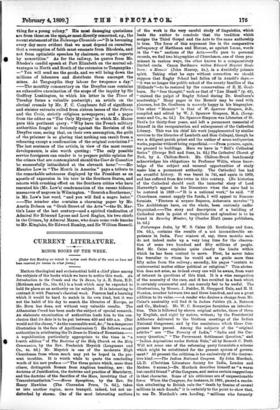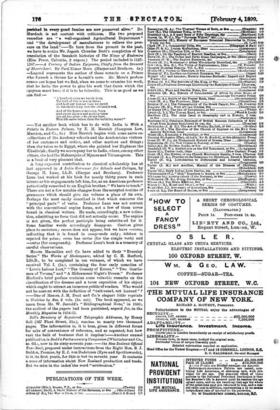Picturesque India, by W. S. Caine (G. Routledge and Sons,
10s. sa.), contains the results of a not inconsiderable ex- perience in India. Four winters of, say, three months each do not indeed make up a very long time for the observa- tion of some two hundred and fifty millions of people. But Mr. Caine explains quite clearly the limits within which he has been content to move. First, he never takes the traveller to whom he would act as guide more than fifty miles from the railway ; secondly, his pages "contain nc controversial matter either political or religious." This absten• tion does not arise, as indeed every one will be aware, from want of interest in questions of this kind. It is a wise recognition of the necessity of the case, and it has resulted in a book which is certainly ornamental and can scarcely fail to be useful. The illustrations, by Messrs. J. Pedder, H. Sheppard Dale, and H. H. Stanton, number between two and three hundred, and are a great addition to its value.—A reader who desires a change from Mr. Caine's neutrality will find it in Indian Politics (G. A. Natesun and Co., Madras). Mr. W. C. Bonnerjee furnishes an introduc- tion. This is followed by eleven original articles, three of them by English, and eight by native, writers ; by the Presidential Addresses delivered to the thirteen meetings of the Indian National Congresses, and by the resolutions which these Con- gresses have passed. Among the subjects of the "original articles" are " The Poverty of India," "India and the Cur- rency Question," "The Permanent Settlement Question," and " Indian Aspirations under British Rule," all by Romesh C. Dutt. Will not some one of the reforming party formulate a scheme which might be substituted for the present system of govern- ment ? At present the criticism is too exclusively of the destrac- tire kind.—The Indian National Congress. By John Murdoch, LL.D. (Christian Literature Society for India, London and Madras. 6 annas.)—Dr. Murdoch describes himself as "a warm but candid friend" of the Congress, and makes certain suggestions in that character. Some of his criticisms are of unquestionable force, When the Congress, for instance, in 1891, passed a resolu- tion attributing to British rule the " death by famine of several millions in each decade," it is certainly to the point to show that, to use Dr. Murdoch's own heading, " millions who formerly perished in every great famine are now preserved alive." Dr. Murdoch is not content with criticism, His two proposed remedies are "a well-organised Agricultural Department" and " the development of manufactures to relieve the pres- sure on the land,"—To tarn from the present to the past, we have to notice Mr. Jogesh Chunder Dutt's completion of his translation of the Sanskrit histories of The Kings of Kashmira (Elm Press, Calcutta, 2 rupees.) The period included is 1127- 1587.—A Century of Indian Epigrams, Chiefly from the Sanscrit Rf Bhartrihari. By Paul Elmer More. (Harper and Brothers. 5s.) —Legend represents the author of these sonnets as a Prince who forsook a throne for a hermit's cave. Mr. More's preface rouses our hopes but we find, when we come to examine his work, that he lacks the power to give his work that finish which the epigram must have if it is to be tolerable. This is as good as we can find " L hundred Terra we basely keep,
Yet half of this is lost in'sleeof Acd half our waking time we spend
In the Mold's fully and the old man's end.
And of the hours Female hos, rears And gaunt diseace and perticg tears Are all Om prize :—fic on the slays Who life more values than the bubbling wave!"
—Yet another book which has to do with India is With a Palette in Eastern Palaces, by E. M. Merrick (Sampson Low, Marston, and Co., 5s,) Miss Merrick begins with some naive re- collections of the Academy schools and the Academician visitors of her customers and critics, and other matters and things ; then she takes us to Egypt, where she painted her Highness the Khediviah ; finally we accompany her to India, where, among other sitters, she had the Maharajahs of Mysore and Vizianagram. This is a book of very pleasant chat.
A long-expected contribution to classical scholarship has at last appeared in A Laiin Grononar for Schools and Colleges, by George M. Lane, LL.D. (Harper and Brothers). Professor Lane had worked at his hook for nearly thirty years in such leisuro as his engagements left him, for, as an American professor pathetically remarked to an English brother, " We have to teach." There are not a few notable changes from the accepted routine of grammars which should give the volume a place of its own. Perhaps the most easily described is that which concerns the "principal parts" of verbs. Professor Lane was not content with the conventional supine forms, not a few of them never found in classical writers. He made, accordingly, a new collec- tion, admitting no form that did not actually occur. The supine is not given, the perfect participle being substituied for it. Some familiar words accordingly disappear. Cantons gives place to cantatum; casum does not appear, but we have —casus, indicating that it is found in compounds only ; bibiturn is rejected for lotus; cerno has certus (for the simple verb) and —crew (for compounds). Professor Lane's book is a treasury of careful observations.
Messrs. Macmillan and Co. have added to their " Eversley Series " The Works of Shakespeare, edited by C. H. Herford, Litt.D., to be completed in ten volumes, of which we have received Vql. I. (5s,), containing the four early comedies of " Love's Labour Lost," " The Comedy of Errors," " Two Gentle- men of Verona," and "A Midsummer Night's Dream." Professor Herford's brief preface contains some valuable remarks on the slasaification of the dramas and a terse exposition of his object which ought to attract an immense public of readers. Who would not be content with the definition of "cultivated, not learned" ? —One of Messrs. J. M. Dent and Co.'s elegant little reprints is Sketches by Box, 2 vols. (3s. net). The book appeared, as we learn from Mr. W. Jerrold's " Bibliographical Note," in 1836; the earliest of the papers had been published, unpaid for, in the Monthly Magasine in 1834-35.



































 Previous page
Previous page